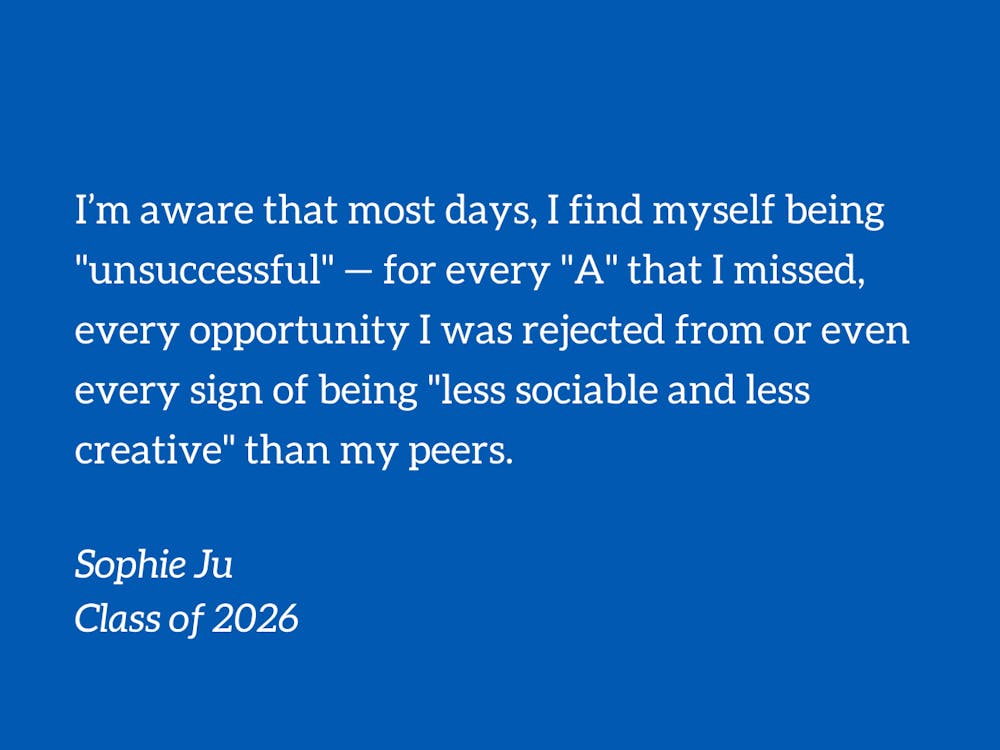“I’ve pulled too many all-nighters this week,” I confessed to my friend while I studied with her for our midterms. My mind flashed back to the repetition of polishing every solution in my 20-page homework assignment. To when I stayed up all night until I finished a music theory assignment at 9:30 AM and felt like I was going to pass out during the next day’s 10:15 class..
“You're spending too much time fretting over things that are negligibly consequential, and driving yourself crazy doing it,” she told me, only half-joking.
My initial reaction? "No, I'm not. I'll do everything I can to get an A in this class. I want to succeed."
Success, rather than the progress of experiencing smaller victories, seems to be an end goal for most of us. And what do we, as a culture, often consider success to be? Intelligence. Academic and professional achievements ought to be celebrated. Those who go on to achieve greatness typically do well at Duke, gaining access to more prestigious internships and graduating with solid plans for their professional futures.
But if we consider traditional intelligence as the key to academic and professional achievement, our definitions of success will be incomplete, as communication, imagination and empathy are all notable qualities — the "social, creative and emotional intelligences." The fact is that many of us may tend to put other things first. We choose to be studying instead of hanging out with friends, we choose more "useful" classes instead of exploring new hobbies or we choose to neglect an opportunity to help someone else because we’re too stressed about our own assignments. I’m not saying everyone takes things that way. But many of us, including myself, forget about alternative paths.
And the truth is, despite their claims of providing a "well-rounded" liberal arts education, top-tier institutions tend to care in cultivating and reproducing one form — “the analytic,” as William Deresiewicz argues in his essay "The Disadvantages of an Elite Education." This might also apply to the Duke community in many ways, as when one is immersed in the hectic pace of an environment, it could be challenging to prioritize personal growth in areas like moral development, emotional stability and artistic practice. Perhaps there is no criterion by which to judge how creative and empathetic a person is, so we tend to gravitate toward academics and professions with measurable benchmarks of success.
Of course, we all have already achieved some kind of success for being at Duke, this highly selective institution. But still, I’m aware that most days, I find myself being "unsuccessful" — for every "A" that I missed, every opportunity I was rejected from or even every sign of being "less sociable and less creative" than my peers. I seem to be the one who fails in all those kinds of “intelligences.”
But truthfully, our success can also be defined by exploring the “contentedness” in our own “spiritual worlds.” What if we spend some time considering what constitutes a successful life? Envision a world where you are alone. Imagine a life in which you’ve never “achieved” anything. Is everything okay with you at the moment? Do you feel calm and peaceful? In what ways do you think you have been successful? If not, what have you learned more about yourself? Do you aspire to any other form of success in the future?
Sometimes when we conduct self-evaluations, it's possible that we don't give ourselves enough credit, as the general public might have a certain “expectation of success” for Duke students. In that case, I especially encourage discussions among ourselves of what success means to each of us. As we have diverse backgrounds, perspectives and goals, it’s also important to recognize and respect how its definition may differ from person to person.
The notion of success has many definitions that apply to different stages of life, so it's never too late to start making progress on exploring and finding our own definition. This coming spring break, I hope, will prove to be a success toward relaxation, health, as well as engagement and exploration in our own “spiritual worlds.”
Sophie Ju is a Trinity first-year. Her column typically runs on alternating Thursdays.
Get The Chronicle straight to your inbox
Signup for our weekly newsletter. Cancel at any time.

